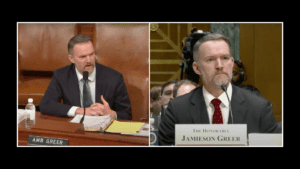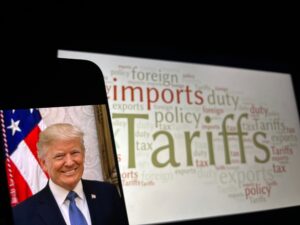Ambassador Jamieson Greer’s Testimonies on the President’s 2025 Trade Policy Agenda
The U.S. Trade Representative, Jamieson Greer, testified before the Senate Finance Committee on Tuesday, April 8, and the House Ways & Means Committee, on Wednesday April 9, about the Trump Administration’s 2025 Trade Policy Agenda.
04/08/2025 | U.S. Senate Finance Committee
04/09/2025 | U.S. House Ways & Means Committee
America’s Three Demands

The following piece includes excerpts from Oren Cass’ blog post, “America’s Three Demands”. Oren Cass will be a featured speaker at WITA’s upcoming “Mini Intensive Trade Seminar: U.S. Tariffs and Responses“, on Wednesday, April 16.
Let’s begin with the premise: The costs to the United States of attempting to maintain the so-called “liberal world order” have come to outweigh the benefits (perhaps they always did). Of course, it was the United States that chose—indeed, largely dictated—the arrangement in the first place. But that does not preclude revisiting those choices as lessons get learned and conditions change. In the emerging multipolar world, in which China will advance its own interests contrary to ours, we can and should ask more of the many allies who would strongly prefer our sphere to China’s. We should treat our allies fairly and respectfully, and our demands should be reasonable, but the time has come to make them. Free access to the American market and partnership with us in national defense should be contingent upon:
1. Balanced Trade. The United States cherishes free markets and welcomes free trade with other market democracies. But the premise of mutually beneficial free trade is that it operates as trade—countries exchanging things they can make and do best for the things others can make and do better. What we will not tolerate is the situation that we have encountered over the past several decades, where things that we once made in the United States move elsewhere:
not because those places have any genuine advantage in the production, and
not because we are making more of something else once made elsewhere instead, but rather
because countries make policy choices to expand their own manufacturing sectors at America’s expense.
Some economists object that trade deficits simply emerge in nature and are no one’s fault, or else that the real fault lies with the United States for running large budget deficits that lead us to borrow from around the world. To be sure, our budget deficit is a problem that we have an obligation to address. But the idea that these other countries don’t want their trade surpluses and have not actively pursued them is absurd. With the United States committed to maintaining the liberal world order and taking bad advice from near-sighted economists, policymakers elsewhere acted secure in the knowledge that we would do nothing to stop them…
2. Burden Owning. The extent to which U.S. allies have under-invested in their own defense capabilities, and relied instead upon the United States to lead and underwrite all military actions and deterrence around the world, should be deeply humiliating to them. But mostly, it is deeply humiliating to us. We accuse those nations of being “naïve” in their failure to maintain adequate defense, but they have been laughing all the way to the bank, or at least all the way to the more generous social welfare spending they can afford as a result. The United States has been the naïve one, having compliantly footed the bill year after year, its exhortations for greater burden sharing having elicited only smirks…
3. China Out. The third requirement of participation in a U.S.-led economic and security alliance should be the maintenance of a collective perimeter that excludes China. Partners should agree on common tariff barriers, investment restrictions, export controls, and immigration policies. As AI-dominated information networks continue to develop, the technology ecosystem of the free world may also need to be kept apart from the Chinese-dominated one.
03/31/2025 | Oren Cass | Understanding America
Trump’s Use of Emergency Powers to Impose Tariffs Is an Abuse of Power
Jennifer Hillman will be a featured speaker at WITA’s upcoming “Mini Intensive Trade Seminar: U.S. Tariffs and Responses“, on Wednesday, April 16.
In an unprecedented move, President Trump justified the imposition of tariffs on Canada. China, and Mexico under the International Emergency Economic Powers Act (IEEPA) based on an “extraordinary threat” from illegal immigration and drug trafficking. The problem for the president, however, is that IEEPA does not explicitly grant tariff authority at all—indeed, the words “duty” or “tariff” appear nowhere in the statute—and to the extent that it grants power to restrict imports, it requires that there be a direct connection between the action taken (here, broad-based tariffs) and a properly declared national emergency (here, migrants and fentanyl crossing the southern border). But there is no direct connection between tariffs on imports of all goods—no matter how innocent or far removed from fentanyl—and the declared national emergency.
The president’s initial move to impose IEEPA-based tariffs came on Feb. 1, with 10 percent tariffs announced on all goods from China and 25 percent on all goods from Mexico and all goods other than energy products (which were subject to a 10 percent duty) from Canada. The president subsequently paused their application to imports from Canada and Mexico but increased the tariffs to 20 percent on all goods from China. On March 3, he proceeded with the 25 percent tariffs on Mexico and Canada (10 percent on energy products), only to further pause those additional tariffs on Mexico and Canada for any goods meeting the United States-Mexico-Canada Agreement (USMCA) rules of origin. He has also threatened additional IEEPA tariffs on a wide range of products, including cars, semiconductors, and oil, as well as on imports from various other countries. China has responded with retaliatory measures and initiated dispute settlement proceedings at the World Trade Organization. Similarly, Canada responded with tariffs of 25 percent on $155 billion of American goods.
IEEPA has never been used to impose tariffs. Congress enacted IEEPA nearly 50 years ago to give the president the power to act promptly to protect the nation’s security. Although this delegation grants the president broad discretion, it was not meant to provide him with a blank check on trade policy. The U.S. Constitution gives Congress the sole power to regulate foreign commerce and impose tariffs. The president’s powers can thus come only from authority that Congress expressly delegated. This begs the question: Did Congress clearly intend to hand over its tariff authority to the president or to permit him to exercise it in such a sweeping and procedurally skimpy manner? The answer is no, especially without establishing a clear relationship to a particular national emergency.
03/24/2025 | Jennifer Hillman | The Lawfare Institute
Will Trump’s Tariffs Be Good for Auto Workers?
My union’s hope—after the U.S. lost 682,000 jobs because of NAFTA—is that punitive tariffs will incentivize domestic production and build the U.S. manufacturing base. “With these tariffs, thousands of good-paying blue collar auto jobs could be brought back to working-class communities across the United States within a matter of months,” said UAW President Shawn Fain in a statement.
Fain later clarified on CBS’s “Face the Nation” that building a new plant could take years, but he said tariffs could be a “motivator” to bulk jobs back up where companies have eliminated shifts, like at the Volkswagen plant in Tennessee, where the union is negotiating a first contract. At Stellantis, Fain said, the company could bring 2,000 jobs that were lost when it shifted production of the Ram truck to Mexico.
In bargaining there’s a truism that if the company doesn’t give it to you in writing, then don’t believe it. These tariffs promise exactly zero new factories will be built, but a couple things are certain: vehicle prices will go up, perhaps by as much as $6,400, because auto companies will pass on any tariff costs to car buyers; and production will be disrupted due to decreased sales and logistical wrangling, which likely means layoffs. Michigan could be hit hardest….
A Better Way
Every worker in the industrial Midwest can see that “free trade” has been a disaster for us. Town after town, whole sections of our states are hollowed-out husks of their former selves. Deaths of despair are commonplace where prosperity once flourished.
I can completely understand the desire to protect our industries and our communities. But I can also understand that our neighbors to the north and south have that same desire.
My proposal would be to tax or tariff only those vehicles and parts (both domestic and foreign) that are produced in facilities that violate workers’ rights. This approach would defend the good union jobs that are the backbone of our families and communities, and build solidarity with our union brothers and sisters overseas. It would also offer an incentive for nonunion companies to finally respect the rights of their employees to collectively bargain.
This kind of explicitly pro-worker tariff policy clearly isn’t in the cards under this administration, but it’s something to consider as a future political goal now that the taboo around tariffs has been broken. Coupled with a strong international solidarity movement between the U.S., Mexico, and Canada, it would give us more power and leverage than ever. Just as large corporations are global, our solidarity has to span borders to match their sphere of control over production and our lives.
04/02/2025 | Sean Crawford | Labornotes
The Road to a New European Automotive Strategy: Trade & Industrial Policy Options
The European automotive industry stands at a crossroads, facing three concurrent challenges: decarbonizing to tackle climate change, maintaining global competitiveness in a fierce market, and safeguarding economic security amid rising geopolitical tensions. At the heart of the European economy, the automotive sector directly employs 1.4 million people and supports 13 million jobs indirectly across the EU, with implications extending far beyond the industry itself. The transition from internal combustion engine vehicles (ICEs) to electric vehicles (EVs) presents profound challenges, as structural adjustments to production processes and supply chains will significantly affect European employment and economic prospects.
The EU has established a legislative framework for transport sector decarbonization, and the automotive industry has invested substantially in this transition. However, evolving market conditions have created a trilemma of competing objectives: decarbonization, competitiveness, and economic security. Successfully navigating this transition requires a unified yet adaptable European strategy that addresses trade-offs between the objectives, balances short-term priorities with medium- and long-term investments, and coordinates action between private and public sectors.
Each aspect of the trilemma presents both opportunities and challenges for the automotive sector, its supply chain, and the broader European economy. Addressing these issues comprehensively will require coordinated international trade and industrial policies.
The EU aims to achieve 100% zero-emission mobility for all new vehicles by 2035, in line with its commitment to climate neutrality by 2050. This target requires substantial investment in EV infrastructure, battery production, and consumer incentives. However, EV adoption rates vary significantly across member states, creating an uneven transition.
Key challenges include high costs and consumer hesitancy. EVs remain significantly more expensive than comparable ICEs, limiting widespread adoption. Inadequate charging infrastructure and high electricity prices create additional barriers. Europe must also scale up battery production to compete with China’s dominance of the global battery supply chain.
01/27/2025 | Victor do Prado, Elvire Fabry, Arancha González Laya, Nicolas Köhler-Suzuki, Pascal Lamy & Sophia Praetorius | Jacques Delors Institute
WITA – We put the community in trade community.
Information about upcoming WITA and trade community events






